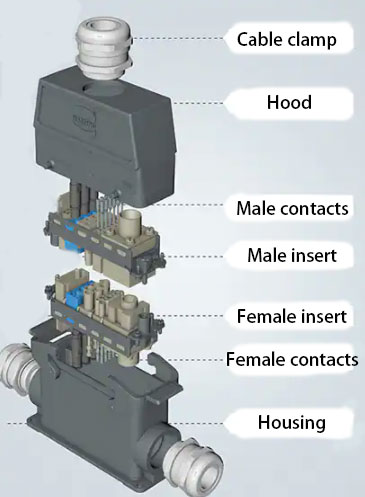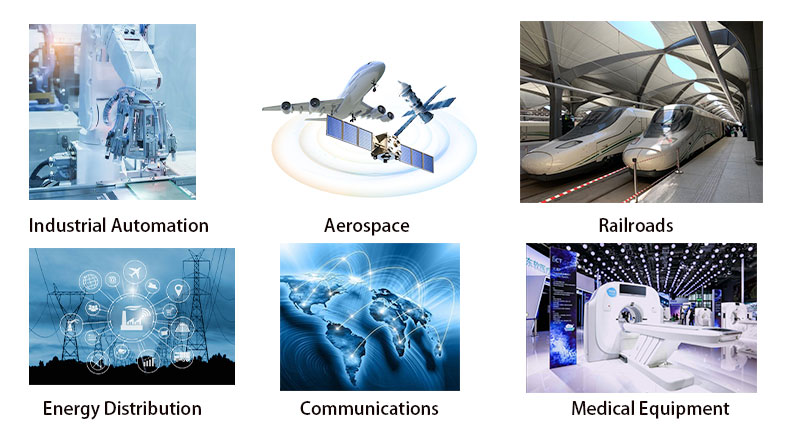What is Heavy Duty Connector?
Heavy duty connector is a key component widely used in electrical and electronic systems, usually used to connect cables, wires, and equipment to transmit power, signals, and data. Heavy duty connectors play a key role in industry, aviation, railroad, energy, and many other fields. ATO.com will introduce the basic structure, characteristics, and application areas of heavy duty connectors in detail.
Basic Structure
The basic structure of a heavy duty connector consists of several key components that work in tandem to establish reliable electrical and mechanical connections.

- Plug: The plug is usually part of the heavy duty connector and is connected to one end of the cable or wire. It consists of metal pins, insulation, and a shell. The pins are used to establish an electrical connection with their counterparts in the socket, the insulation is used to isolate the pins, and the shell is used to protect the internal components of the connector.
- Receptacle: The receptacle is another part of the connector that is usually connected to one end of another cable or device. Like a plug, a receptacle consists of metal pins, insulation, and a shell. The pins inside the socket correspond to the pins of the plug to create an electrical connection.
- Connecting Section: The connecting section is the heart of the heavy duty connector and is usually located between the plug and the socket. This part usually has a rotating, locking, or other mechanical means of ensuring that the plug and socket are tightly connected. Different types of heavy duty connectors have different connection section designs to meet the needs of various applications.
- Shell: The connector's shell is usually made of rugged material to protect the internal components from physical damage and environmental factors. The housings are usually waterproof, dustproof, and corrosion resistant to suit various application scenarios.
Features
Heavy duty connectors have many unique features that make them popular in a variety of applications. Some of the key features are listed below.
- High Current and High Voltage Support: Heavy duty connectors are typically designed to support high current and high voltage applications. They can transmit large amounts of power and are suitable for large electrical systems, mechanical equipment, and industrial applications.
- Durability and Reliability: Heavy duty connectors are typically made of high quality materials and have a rugged construction to ensure their reliability in harsh conditions. They are carefully designed to withstand vibration, temperature changes, and other environmental factors.
- Multi Wire Connections: Connectors typically have multiple wires or pins that allow the connection of multiple wires or cables. This makes them suitable for complex systems of multiple electrical circuits.
- Protection: Some heavy duty connectors are waterproof, dustproof, and corrosion resistant to withstand harsh environmental conditions. This makes them suitable for outdoor, industrial, and aerospace applications.
- Quick Connect and Disconnect: Although the name of heavy duty connectors implies that they are "heavy duty", they still have the ability to connect and disconnect relatively quickly. This facilitates fast maintenance and repair.
- Highly Customizable: Connectors can often be customized to meet the needs of a specific application, including different types, sizes, and configurations. This allows the connector to meet the requirements of a wide variety of projects.
- Application Versatility: Heavy duty connectors are used in a wide range of applications in many fields, including industrial automation, aerospace, energy distribution, railroads, medical devices, and communications. They are suitable for a wide range of connection needs.
Areas of Application
Heavy duty connectors play a key role in a variety of applications, providing reliable electrical connections and mechanical connections. Here are some of the major application areas.
- Industrial Automation: Industrial automation is one of the major application areas for heavy duty connectors. They are used to connect sensors, actuators, controllers, and other automation devices to ensure reliable data transmission and power distribution.
- Aerospace: In aerospace, heavy duty connectors are used to connect electrical systems, communication equipment, and sensors in aircraft, satellites, and spacecraft. They must operate in extreme environmental conditions and provide highly reliable connections.
- Energy Distribution: Energy distribution is another major application area where heavy duty connectors are used to connect power generation equipment, transformers, cables, and switchgear. They support high current and high voltage applications, ensuring the reliability of power transmission.
- Railroads: The railroad industry uses heavy duty connectors to connect electrical systems, signaling equipment, and communication systems in trains. They must be ruggedized to withstand train vibration and harsh weather conditions.
- Medical Equipment: In the medical equipment field, heavy duty connectors are used to connect medical instruments, sensors, and monitoring equipment. They must be highly reliable and hygienic for the medical environment.
- Communications: Communications equipment often requires the connection of high current and high frequency cables to transmit data and signals. Heavy duty connectors play a key role in communications equipment.

Heavy duty connectors are an indispensable piece of electrical connecting equipment with superior durability, high performance, and versatility for a variety of applications. By understanding its basic structure, component composition, features, and application areas, we can better understand perfect heavy duty connector importance in industry, manufacturing, power, and transportation. In the future, heavy duty connectors will continue to adapt to new technologies and applications, supporting reliable electrical connections to meet growing demand.

